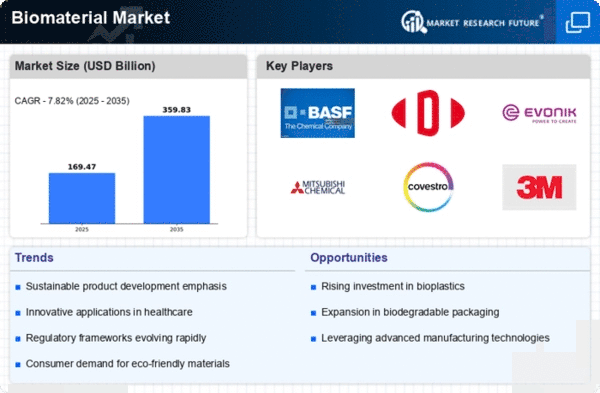Market Share
Biomaterial Market Share Analysis
In the fiercely competitive Biomaterials market, companies utilize strategic positioning of their market share to establish a strong presence and attain an edge over rivals. One important approach is continual innovation in biomaterial technologies. R&D investments into production of advanced biomaterials with improved compatibility, mechanical properties and bio effectiveness can make companies unique in the market. The provision of advanced biomaterial solutions brings interest to various industries, including healthcare, orthopedics dentistry and tissue engineering. The strategic partnerships and collaborations play a crucial role in market share positioning. Companies that partner with research institutions, universities and medical centers can gain more advanced R&D resources develop applications of biomaterials. Collaboration also allows companies to participate in groundbreaking research, prove clinical efficiency of their biomaterials and establish themselves as leaders within the developing field of Biomaterial Science. Market share positioning strategies focus on customization and adaptability. Companies that produce biomaterials, which are customizable to suit a wide range of medical applications and patient types can develop products that meet the needs specific to different sectors. Fine-tuning biomaterials to solve problems faced by orthopedic implants, dental prosthetics, and tissue regeneration improves market uptake because it makes the companies appear client responsive. Market share positioning is based on a strong marketing and educational approach. Firms that undertake holistic marketing campaigns, educational programs and thought leadership projects can develop awarenesses and authority. Companies should emphasize the advantages of biomaterial solutions in terms of biocompatibility, durability, and clinical performance to develop partnerships with healthcare providers, researchers and manufacturers interested in new innovative kinds. These major strategies are continuous product improvement and life cycle management. Companies that place the emphasis on continuous research, follow scientific progress and keep developing existing biomaterials can improve their efficiency, safety as well as applicability. Frequent updates and enhancements guarantee that companies stay leading biomaterial innovation firms with respect to developing industry standards and laws. Market share positioning requires compliance with regulatory standards and quality is paramount. Companies that can maneuver such challenging regulatory environments, achieve necessary approvals, and ensure absolute quality assurance earn trust from healthcare professionals as well as manufacturers. International standards compliance increases the level of market acceptance for biomaterials and makes companies a trustworthy representative.



















Leave a Comment